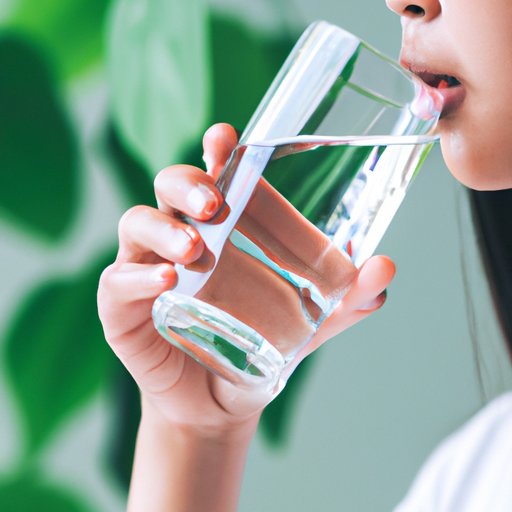Introduction
Imagine going hours without drinking water. If you’re like most people, your first hint of thirst may not sound the alarm that it’s time to hydrate. Unfortunately, being mildly dehydrated even for a few hours may begin to show negative effects on both your physical and mental well-being. In this article, we’ll be exploring the relationship between dehydration and how our bodies and minds function, the dangers of dehydration, and tips for staying hydrated.
Exploring the Link Between Dehydration and the Human Body
Dehydration occurs when the body has lost more water than it’s taken in. This condition can happen to anyone who’s not drinking enough water especially if they have higher fluid loss due to hot and dry weather or exercise and stress.
The early symptoms of dehydration include headache, dry mouth, thirst, dark urine, rapid heartbeat, rapid breathing, fatigue, decreased urine output, and dry skin.
But it doesn’t stop there. Dehydration can also lead to more concerning problems including kidney stones, which can be extremely uncomfortable and require hospitalization in severe situations. Additionally, dehydration increases the risk of fatigue, migraines, and can even impact athletic performance by causing muscle cramps.
Common situations that can lead to dehydration include hot weather, high altitudes, traveling, working out, and sicknesses that cause diarrhea or vomiting.
The Benefits and Importance of Drinking Water
The human body is approximately 60% water, and drinking water is essential to maintaining a healthy and happy body and mind. Moreover, drinking water can positively impact many areas of our lives.
Drinking water can help with physical activity, cognitive function, skin health, kidney function, and digestion. Several studies have shown that drinking water boosts our brain activity, improves short-term and long-term memory, and increases focus and concentration levels.
Intake of enough water to meet daily requirements (six to eight glasses daily) also has a positive impact on our metabolic rate, which is the number of calories we burn per day. Several studies have shown a link between water intake and a reduction in overall calorie intake, leading to weight loss.
Dangers of Dehydration
Dehydration can cause several harmful health effects. Severe dehydration can result in seizures, unconsciousness, and death. Moreover, dehydration can impair cognitive function and negatively impact mood and mental well-being.
When we don’t drink enough water, we run the risk of developing health problems, including urinary tract infections (UTIs), constipation, and kidney stones. Long term dehydration can lead to severe kidney damage as well as permanent liver disease.
The best way to avoid these problems is by staying hydrated.
Water Intake and its Impact on Mental Health
The link between dehydration and mental health is an often-overlooked one. Whether you’re experiencing brain fog or a bad mood, dehydration might be the culprit. Studies show that dehydration can lead to poor mental health, causing mood swings and short-term memory issues.
When we’re properly hydrated, we can think more clearly, maintain a stable mood, and perform better when it comes to cognitive tasks.
Alternative Ways of Staying Hydrated
If drinking plain water isn’t your thing, there are other ways to stay hydrated. Eating fruits and vegetables with high water content is an option, such as watermelons and cucumbers. Other refreshing, hydrating drinks include coconut water, herbal tea, and milk, though be mindful of added sugars.
The Link between Skin Health and Water Consumption
Drinking water is also good for our skin health. Good hydration fights against wrinkles and promotes skin elasticity. Our bodies eliminate toxins when we sweat, which helps keep skin clear and clean.
When we don’t consume enough water, our skin can become flaky, dry, and irritable. Moreover, our complexion can look dull and aging signs set in.
Myths and Misconceptions Surrounding Hydration
There are several myths about hydration that we need to clarify. For instance, it’s commonly believed that the only time you need to drink extra water is when you feel thirsty. However, our sense of thirst is not always a reliable indicator of dehydration, particularly in the elderly.
Another myth is that we need to drink eight glasses of water a day, but that’s only a guideline as everybody’s water needs differ, depending on various factors like weather, activity levels, and specific medical conditions.
Conclusion
Drinking water is crucial for overall well-being, providing essential nutrients to your body and helping maintain numerous functions. Whether you’re trying to lose weight, improve your mood, or specifically, stay healthy, be sure to drink enough water each day. Remembering to stay hydrated, especially when life gets hectic, can be challenging; however, the benefits of drinking water far outweigh the temporary inconvenience.
